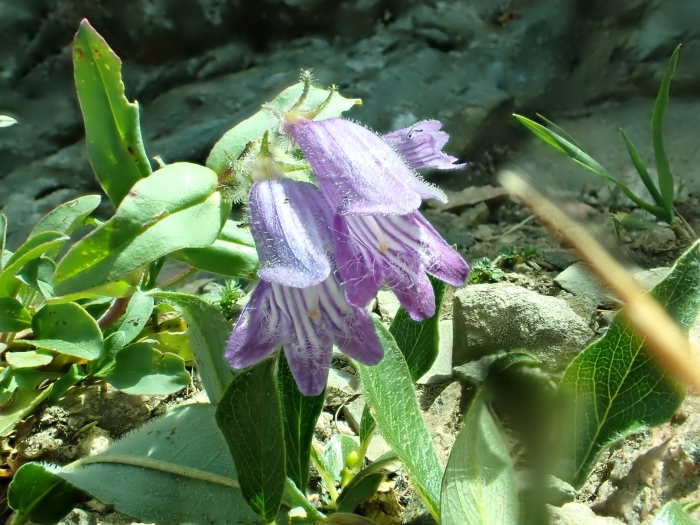Whipple’s Beardtongue
(Penstemon whippleanus)
Whipple’s Beardtongue (Penstemon whippleanus)
/
/

Matt Lavin
CC BY 4.0
Image By:
Matt Lavin
Recorded By:
Copyright:
CC BY 4.0
Copyright Notice:
Photo by: Matt Lavin | License Type: CC BY 4.0 | License URL: http://creativecommons.org/licenses/by/4.0/ | Rights Holder: Matt Lavin | Publisher: iNaturalist | Date Created: 2023-08-11T11:32:46-07:00 |
























Estimated Native Range
Summary
Penstemon whippleanus, commonly known as Whipple’s beardtongue or dusky penstemon, is a perennial herb that is native to montane and subalpine regions of the Rocky Mountains in North America. It is typically found in open slopes, meadows, and woodland openings, often at elevations between 8,000 and 12,000 feet where it contributes to the biodiversity of these ecosystems. This species grows 8-26 inches tall and features large, tubular flowers that are deep purple-red, blooming from late spring to early summer. The flowers are particularly showy and attract a variety of pollinators, including bees and hummingbirds.
Whipple’s beardtongue is valued for its striking flowers and adaptability to high-altitude garden settings. It is often used in rock gardens, native plant gardens, and as a border plant. Its drought tolerance makes it suitable for xeriscaping. In cultivation, it requires well-drained soils and thrives in full sun to partial shade. While it is generally low-maintenance, it can be susceptible to root rot in poorly draining soils and may be affected by fungal diseases in humid conditions. There are no widely known cultivars of this species, but its natural form is quite appealing in garden settings. Gardeners should be aware that while it is drought-tolerant, it does not tolerate overwatering or heavy, wet soils.CC BY-SA 4.0
Whipple’s beardtongue is valued for its striking flowers and adaptability to high-altitude garden settings. It is often used in rock gardens, native plant gardens, and as a border plant. Its drought tolerance makes it suitable for xeriscaping. In cultivation, it requires well-drained soils and thrives in full sun to partial shade. While it is generally low-maintenance, it can be susceptible to root rot in poorly draining soils and may be affected by fungal diseases in humid conditions. There are no widely known cultivars of this species, but its natural form is quite appealing in garden settings. Gardeners should be aware that while it is drought-tolerant, it does not tolerate overwatering or heavy, wet soils.CC BY-SA 4.0
Plant Description
- Plant Type: Shrub, Herb
- Height: 1.5-2.5 feet
- Width: 1-1.5 feet
- Growth Rate: Rapid
- Flower Color: Purple, Red, White
- Flowering Season: Spring, Summer, Fall
- Leaf Retention: Deciduous, Semi-deciduous
Growth Requirements
- Sun: Full Sun, Part Shade
- Water: Low, Medium
- Drainage: Fast, Medium
Common Uses
Border Plant, Butterfly Garden, Deer Resistant, Low Maintenance, Showy Flowers
Natural Habitat
Montane and subalpine regions of the Rocky Mountains, often at elevations between 8,000 and 12,000 feet
Other Names
Common Names: Whipple’s Penstemon, Dark Beardtongue
Scientific Names: , Penstemon whippleanus, Penstemon arizonicus, Penstemon glaucus var. stenosepalus, Penstemon pallescens, Penstemon stenosepalus,
GBIF Accepted Name: